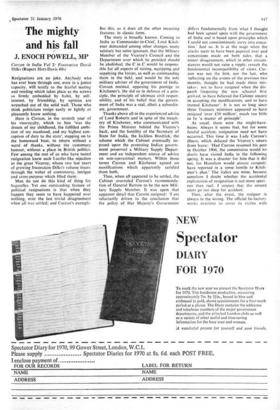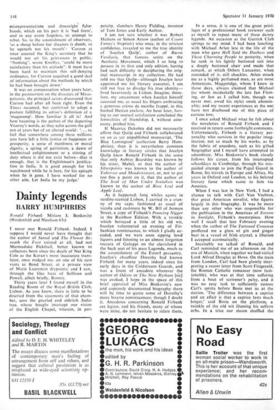The mighty and his fall
J. ENOCH POWELL, MP
Curzon in India Vol 2: Frustration Da', id Dilks (Rupert Hart-Davis 60s) Resignations are no joke. Anybody who has ever been through one, even in a junior capacity, will testify to the fearful tearing and rending which takes place as the screws so firmly embedded by habit, by self- interest, by friendship, by opinion are wrenched out of the solid wall. Those who think politicians resign easily or lightly or pleasantly know nothing.
Here is Curzon, in the seventh year of his viceroyalty, which to him 'was the dream of my childhood, the fulfilled ambi- tion of my manhood, and my highest con- ception of duty to the state', stepping on to the homeward boat, to return without a word of thanks, without the customary honour, without a place in British politics. Few among the rest of us who have tasted resignation knew such Lucifer-like rejection as the great Viceroy, whose two last years of growing frustration Dilks's volume traces through the welter of controversy, intrigue and cross-purpose which filled them.
Men do not do this kind of thing for bagatelles. Yet one outstanding feature of political resignations is that when they happen they seem to have happened over nothing, over the last trivial disagreement when all was settled; and Curzon's exempli-
fies this, as it does all the other recurring features, in classic form.
The story is broadly known. Coming to India as Commander-in-Chief, Lord Kitch- ener demanded among other changes, many salutary but some ignorant, that the Military Member of the Viceroy's Council and the Department over which he presided should be abolished; the C in C would be respons- ible for all aspects of raising, equipping and supplying the forces, as well as commanding them in the -field, and would be the sole military adviser of the government of India. Curzon resisted, opposing his prestige to Kitchener's. He did so in defence of a prin- ciple, the principle of ultimate civil respon- sibility, and of his belief that the govern- ment of India was a real, albeit a subordin- ate, government.
Thanks above all to the experienced advice of Lord Roberts and in spite of the treach- ery of Kitchener, who communicated with the Prime Minister behind the Viceroy's back, and the hostility of the Secretary of State for India, the luckless Brodrick, the scheme which the Cabinet eventually im- posed upon the protesting Indian govern- ment preserved a Military Supply Depart- ment and an independent source of advice on non-operational matters. .Within those terms Curzon and Kitchener agreed on modifications which apparently satisfied them both.
Then, when all appeared to be settled, the Cabinet overruled Curzon's recommenda- tion of General Barrow to be the new Mili- tary Supply Member. It was upon that apparent detail that Curzon resigned : 'I am reluctantly driven to the conclusion that the policy of Her Majesty's Government differs fundamentally from what I thought had been agreed upon with the government of India and is based upon principles which I could not conscientiously carry into execu- tion.' Just so. It is at the stage when the cracks seem to have been papered over and concessions made on both sides, that a minor disagreement, which in other circum- stances would not raise a ripple, reveals the fundamental incompatibility of views. Cur- zon was not the first, nor the last, who 'reflecting on the events of the previous two months, thought he had made three mis- takes: not to have resigned when the dis- patch [imposing the new schemel first arrived; to have believed the Cabinet sincere in accepting the modifications; and to have trusted Kitchener'. It is not so long since three Treasury ministers appeared to have resigned 'over £50 million', much too little to be 'a matter of principle'.
As usual, there were the might-have- beens. Always it seems that, but for some fateful accident, resignation need not have occurred. This time it was Lady Curzon's illness, which delayed the Viceroy's return from leave: 'Had Curzon resumed his post in October 1904, the commission would no doubt have visited India in the following spring. It was a disaster for him that it did not, for Hamilton would almost certainly have reported in a sense hostile to Kitch- ener's plan.' The italics are mine, because somehow I doubt whether the accidental explanation of resignation is not more speci- ous than real: I suspect that the unseen roots go too deep for accident.
Then, after the event, the resigner is always in the wrong. The official lie-factory works overtime to cover its victim with misrepresentations and downright false- hoods, which on his part it is 'bad form', and in any event hopeless, to attempt to rebut. So, to the astonishment of observers, 'as a sheep before her shearers is dumb, so he openeth not his mouth': 'Curzon at once assured the King's secretary that he would not air his grievances in public. "Nothing", wrote Knollys, "could be more satisfactory than his attitude". It must have been hard to maintain this self-denying ordinance, for Curzon acquired a good deal of information about the methods by which he had been brought down'
It was no compensation when years later, in the postmortem on the disasters of Meso- potamia, the principal actors discovered that Curzon had after all been right. Even the Times recanted, but contrived to adopt a posture fulfilling its editor's definition of a 'mugwump'. How familiar it all is! And how haunting is the pathos of the departing Viceroy's words, as they echo across the gulf
not of years but of an altered world: to feel that somewhere among these millions you have left a little justice or happiness or prosperity, a sense of manliness or moral dignity, a spring of patriotism, a dawn of intellectual enlightenment or a stirring of duty where it did not exist before—that is enough, that is the Englishman's justifica- tion in India. It is good enough for his watchword while he is here, for his epitaph when he is gone. I have worked for no other aim. Let India be my judge.'



































 Previous page
Previous page